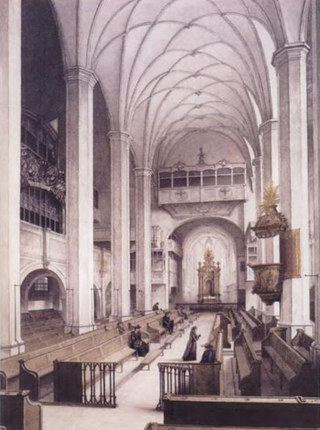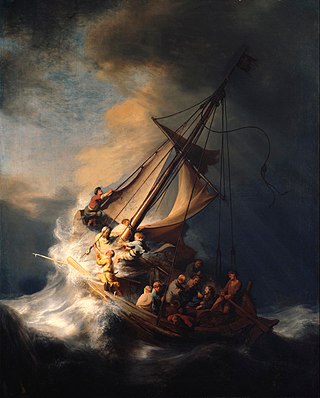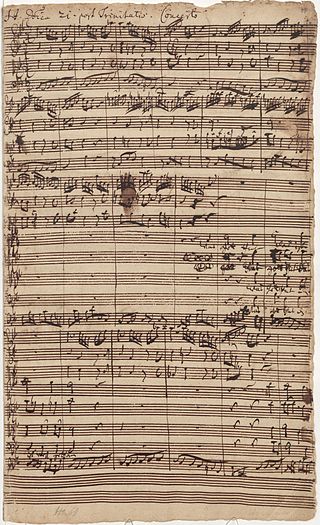Related Research Articles

Johann Sebastian Bach composed the church cantata Es ist nichts Gesundes an meinem Leibe, BWV 25 in Leipzig for the 14th Sunday after Trinity and first performed it on 29 August 1723.

Jesus schläft, was soll ich hoffen?, BWV 81, is a church cantata by Johann Sebastian Bach. He composed it in 1724 in Leipzig for the fourth Sunday after Epiphany and first performed it on 30 January 1724.
Klaus Mertens is a German bass and bass-baritone singer who is known especially for his interpretation of the complete works of Johann Sebastian Bach for bass voice.
Kurt Equiluz was an Austrian classical tenor in opera and concert. He was a member of the Vienna State Opera as a tenor buffo from 1957 until 1983, remembered for roles such as Pedrillo in Mozart's Die Entführung aus dem Serail. He appeared regularly at the Salzburg Festival, including world premieres such as Rolf Liebermann's Penelope in 1954. He recorded works by Johann Sebastian Bach with conductors such as Michel Corboz, Helmuth Rilling and Charles de Wolff, and prominently as the Evangelist in the first recording of Bach's St John Passion on period instruments with the Concentus Musicus Wien in 1965, conducted by Nikolaus Harnoncourt.
Dorothee Mields is a German soprano concert singer of Baroque and contemporary music.
Harry van der Kamp is a Dutch bass singer in opera and concert. Mostly active in Historically informed performance, he founded the Gesualdo Ensemble. He is also an academic voice teacher.

Jan Kobow is a German classical tenor in concert, Lied, and Baroque opera.
Werner Güra is a German classical tenor in opera, concert and Lied, also an academic teacher in Zurich.

Johann Sebastian Bach composed the church cantata Ach! ich sehe, itzt, da ich zur Hochzeit gehe, BWV 162, in Weimar for the 20th Sunday after Trinity and first performed it in 1715 or 1716.

Schau, lieber Gott, wie meine Feind, BWV 153, is a church cantata by Johann Sebastian Bach. He composed it in Leipzig for the Sunday after New Year's Day and first performed it on 2 January 1724.

Johann Sebastian Bach composed the church cantata Ach Herr, mich armen Sünder, BWV 135 in Leipzig for the third Sunday after Trinity and first performed it on 25 June 1724. It is the fourth chorale cantata from his second annual cycle, and is based on the hymn by Cyriakus Schneegass.

Johann Sebastian Bach composed the church cantata Herr Jesu Christ, du höchstes Gut, BWV 113 in Leipzig for the eleventh Sunday after Trinity and first performed it on 20 August 1724. The chorale cantata is based on the hymn "Herr Jesu Christ, du höchstes Gut" by Bartholomäus Ringwaldt (1588).

Johann Sebastian Bach composed the church cantata Was Gott tut, das ist wohlgetan, BWV 99, in Leipzig for the 15th Sunday after Trinity and first performed it on 17 September 1724. The chorale cantata is based on the hymn "Was Gott tut, das ist wohlgetan" by Samuel Rodigast (1674).

Johann Sebastian Bach composed the church cantata Was Gott tut, das ist wohlgetan, BWV 98, in Leipzig for the 21st Sunday after Trinity and first performed it on 10 November 1726.

Liebster Immanuel, Herzog der Frommen, BWV 123, is a church cantata by Johann Sebastian Bach. He composed the chorale cantata in Leipzig for Epiphany and first performed it on 6 January 1725. It is based on the hymn by Ahasverus Fritsch (1679).

Meinen Jesum laß ich nicht, BWV 124, is a church cantata written by Johann Sebastian Bach. He composed the chorale cantata in Leipzig for the first Sunday after the Epiphany and first performed it on 7 January 1725. It is based on the hymn "Meinen Jesum laß ich nicht" by Christian Keymann.
Max Ciolek is a German tenor, conductor and composer. He is the founder of VokalEnsemble Köln. As a singer, he is noted for his recordings of Bach works, particularly the Evangelist in his Passions, but he has recorded music from all periods of classical music and has appeared internationally.
Georg Poplutz is a German tenor, a soloist in Baroque music, opera and oratorio, and a Lied singer. He has been a member of vocal ensembles such as Johann Rosenmüller Ensemble and Cantus Cölln, and has participated in a project to record the complete works of Heinrich Schütz.
Wilfried Jochens is a German tenor. A graduate of Hamburg University and the State College for Music and Fine Arts, studying under Johannes Hoefflin, he has worked as a concert singer since 1972. He is particularly noted for his performances as the Evangelist in Bach's Passions. He has performed many of the Bach cantatas, and has also performed the principal oratorios of George Frideric Handel, Monteverdi, Haydn, Mozart and Felix Mendelssohn. He is a member of the vocale ensemble Cantus Cölln. Since 1982 he has been a singing teacher at the Hamburg College of Music. Among his pupils was Knut Schoch.
David Cordier is an English countertenor. He made an international career based in Germany, and appeared both in concert and opera. While focused on roles by Handel such as Radamisto, he has also performed in contemporary opera, including works by Aribert Reimann and Péter Eötvös.
References
- 1 2 3 4 5 "Knut Schoch" (in German). Akademie für Alte Musik Bremen. 2010. Retrieved 15 January 2013.
- 1 2 "Knut Schoch (Tenor)". bach-cantatas.com. 2001. Retrieved 15 January 2013.
- ↑ "Knut Schoch". arkivmusic.com. 2013. Retrieved 15 January 2013.
- ↑ "Knut Schoch" (in German). Junge Kantorei. 2011. Archived from the original on 22 April 2012. Retrieved 15 January 2013.
- ↑ Forsling, Göran (2006). "George Frideric Hadel (1685–1759) / Solomon - An Oratorio in three Parts (1748)". musicweb-international.com. Retrieved 15 January 2013.